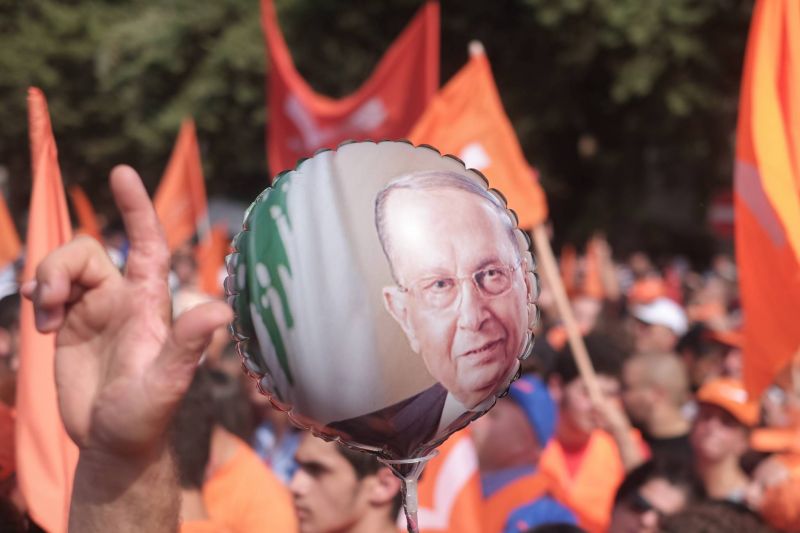
Supporters rally Sunday during the expiry of outgoing President Michel Aoun's mandate, amid a deepening economic and political crisis. (Credit: João Sousa/L'Orient Today)
Want to get the Morning Brief by email? Click here to sign up.
Free Patriotic Movement supporters on Sunday bid farewell to party founder President Michel Aoun as he vacated the Baabda Presidential Palace on the eve of the end of his term in office. Aoun assumed the office in 2016 after a 30-month impasse in Parliament. Six years later, a similar deadlock and presidential vacuum looms with no apparent consensus among parliamentarians on who the next head of state will be. Shortly before leaving office, Aoun warned of “constitutional chaos,” referring to a dual executive vacuum that may imminently arise due to the cabinet’s caretaker status. The powers endowed to a caretaker cabinet in the event of a presidential vacuum remain an issue of debate. Parliament elected caretaker Prime Minister Najib Mikati to form Lebanon’s next government; however, government formation has stagnated. The president’s final speech called on Mikati to “recuse himself,” after Aoun attempted to dissolve the current resigned government in a letter to Parliament Speaker Nabih Berri. The caretaker premier denied the legal basis of the letter, claiming that his government "will continue to carry out all its constitutional duties.” Berri, sidestepping the executives’ rut, said he will schedule an election session “within three days.” Last Monday marked the fourth failed attempt to elect a new president, with a majority of MPs once again casting protest votes. Lebanese Forces leader Samir Geagea called on Berri to schedule an extended session, alluding to the loss of quorum induced by MPs leaving after a first round of voting during which votes from two-thirds of Parliament, 86 of 128 deputies, are needed to elect a president. The exit is perceived as a tactic to prevent the vote from progressing to further rounds during which only a simple majority (65) rather than two-thirds of votes are needed to name the next head of state. Information International revealed that Aoun’s term broke a record compared to all past presidential terms since 1943 of days with caretaker governments, which accounted for 43 percent of his presidency.
Caretaker Electricity Minister Walid Fayad on Friday launched fuel purchasing tenders after the arrival of a delayed fuel shipment, supposedly capable of supplementing state power provider Electricité du Liban’s coverage by around three hours per day. The bid aims to procure enough fuel to supply eight to 10 hours of electricity per day for six months. Banque du Liban approved funding for the tender, estimated between $100 to 150 million per month, while stipulating that EDL returns the sum through an upcoming electricity tariff hike. The fuel deliveries are expected between Dec. 1 and Dec. 10. Until then, EDL will have to rely on a recently received shipment of 30,000 tons of gas oil bartered from 80,000 tons of Iraqi fuel oil. Lebanon extended for a year an agreement to import Iraqi oil — which is incompatible with Lebanese power plants but can be traded for suitable fuel — while 100,000 tons of the substance obtained from the initial agreement remain untraded. Officials have attempted to find alternative sources of fuel as shortages lead to increasingly marked electricity supply deficits. Proposed solutions for Lebanon’s electricity crisis include electricity from Jordan, importing gas from Egypt, or fuel from Iran — each having their own caveats. The first and second agreements were signed in January and June, respectively; however, their implementation has stalled. The Iranian fuel agreement was endorsed by both sides last month yet no apparent progress has been made.
Cholera risks becoming endemic in Lebanon, the caretaker health minister warned yesterday, as the Health Ministry is set to unveil its cholera vaccination plan today. “If we fail to stop the spread of the epidemic, we are afraid of facing an endemic state of cholera in Lebanon,” Firas Abiad said on Sunday, while highlighting that an intervention to stop the epidemic is still possible. As of Monday, the number of cholera-related deaths rose to 17 and the total number of confirmed cases reached 388, according to a statement by the Ministry of Health on Twitter. An endemic disease is a disease that is consistently present in a certain area or region, where the number of patients and the extent of the spread can be predicted. Abiad expressed fears that the disease could have a “huge impact on the economy” due to its consequences on agricultural exports and tourism and on raw produce. Abiad earlier in the month announced the importation of vaccines among a series of measures to curb the spread of cholera. Local and international actors have collaborated to provide fuel to power water infrastructure, established field hospitals, trained frontline workers and organized awareness-raising campaigns.
Following an “extremely constructive discussion” on Friday between Lebanese officials and a Cypriot delegation, caretaker Prime Minister Najib Mikati created a committee tasked with "the demarcation of the Lebanese Exclusive Economic Zone with Cyprus and Syria.” Lebanese officials are seemingly capitalizing on the momentum from successfully concluding indirect maritime border negotiations with Israel on Thursday after signing a US-mediated agreement delineating its new southern border. While Lebanon and Cyprus reportedly agreed on a “formula” regarding their shared border, progress may be stalled until negotiations with Syria are concluded. Last week, Syria postponed a visit from a Lebanese delegation intending to discuss maritime border negotiations, citing a “miscommunication.”
In case you missed it, here's our must-read story from over the weekend: “In rural Lebanon, autumn’s first rains summon an annual delicacy.”
Compiled by Abbas Mahfouz